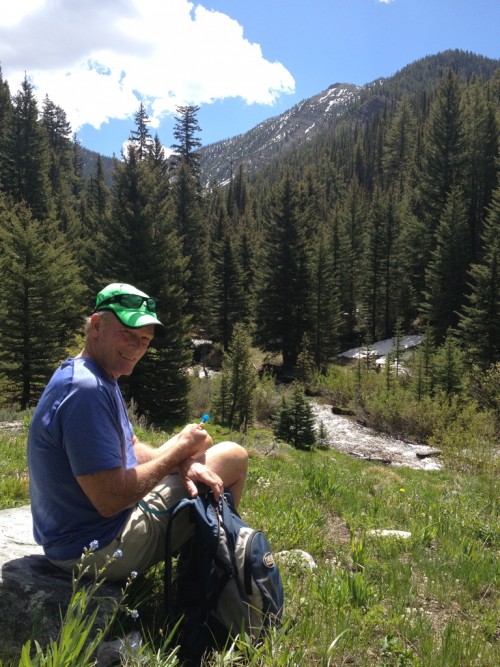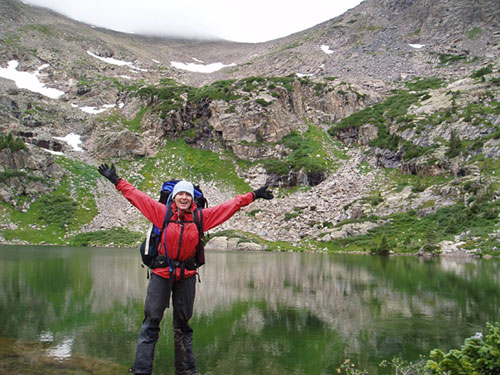“The Outward Bound experience is worthy in and of itself. The lessons and experience can provide the seeds of a wisdom that may – in the long run – outgrow one’s college experience. The introspection and confidence one takes from an Outward Bound course will help set a deep keel during college.” –Bob Brock, College Counselor for Acorn Academics in Ketchum, Idaho
Sound the alarms. Ring the bells. College application season has officially begun. In early August, the Common Application (an online undergraduate college application accepted by over 600 independent colleges) released its list of 2015/2016 essay prompts, signaling the start of hair-pulling, soul-searching, and at least a few late nights spent at kitchen tables around the country. However, parents and students needn’t resign themselves to an epic battle of writer vs. blank page. With a few proven strategies and some real-life Outward Bound experience, applicants can be well on their way to a killer college essay – without penning a single line.
To help with the all-important task of composing the college essay, we consulted an expert. We talked to college counselor and writing guru Bob Brock, who has served hundreds, if not thousands of college applicants during his 24-year tenure as the Director of College Counseling at Community School, a college preparatory school located in Sun Valley, Idaho. Since his “retirement” two years ago, Brock has continued to help students improve standardized test scores and round out college essays. Brock laughs as he explains that his current work with Acorn Academics is “half technical, half therapeutic.” “The students I see are usually in good, but often too busy, hands,” Brock explains. “I help them keep perspective.”

Bob Brock hiking in the Big Wood River, Sawtooth National Recreation Area.
More than a sage source of college application wisdom, however, Brock is also an Outward Bound alum whose legacy dates back to the 1970’s, when he completed a Colorado Outward Bound School course for college grads and administrators. With firsthand Outward Bound experience and an entire career of college counseling under his belt, Brock is well qualified to answer our most pressing application questions.
First things first, we asked Brock about what Outward Bound has to do with the college application process.
Q: How might an Outward Bound experience help students get into college?
A: Of course, the Outward Bound experience is worthy in and of itself. The lessons and experience can provide the seeds of a wisdom that may – in the long run – outgrow one’s college experience. The introspection and confidence one takes from an Outward Bound course will help set a deep keel during college. Outdoor education and expedition based experiences like Outward Bound are highly respected; a certification of sorts that a student has put herself into stressful circumstances and emerged with an appreciation of difference, a determination to overcome adversity, an opportunity for self-reflection, and a respect for the outdoors. The Outward Bound experience will be put into the context of the overall application. A student should embrace his Outward Bound experience for what it is, not necessarily for its trade value.

The Solo during an Outward Bound expedition helps students learn introspection and respect for the outdoors. Photo by Jon Reynolds
Q. Should students list “Outward Bound grad” on their resume?
A. Certainly. Make sure to add the specific course and length since there are so many different experiences. The detail beyond that should be consistent with the format of the resume. On the Common Application a student might be able to include Outward Bound under Activities, and if applicable indicate an interest in pursuing similar outdoor activities in college.
Q. Do you ever suggest students take a Gap Year with Outward Bound? How does that affect college admissions?
A. I absolutely suggest that students take a Gap Year with Outward Bound. Generally, students apply to college while their support structure (college counselors, teachers, recommenders) is in place, then request to defer entrance for a year. Could a student reapply to colleges with an extended Outward Bound experience under his belt? Of course. There is no doubt that the student would be more experienced, mature, and motivated.

An Outward Bound Gap Year student kayaks overseas during the Florida Keys to Costa Rica Leadership Semester.
Q. How does a college essay play into the admissions process?
A. The college essay (with supplements) is a student’s main opportunity to express his own voice. It is only through the essay that the student gets a chance to speak for him or herself. The role that an essay plays in the college admission process varies. Large state universities may make admissions decisions based on GPA and test scores; but most colleges strive to read applications holistically. Academic performance will always be the principal factor, but the essay can “tip” an application one way or another. After a point, the numbers (GPA/SAT) and listed honors sound the same.
Q. What are admissions officials looking for in a college essay?
A. The elusive and overworked word is “authenticity.” It’s the difference between a unique guitar and the fretwork in a teenage cover band: you know it when you hear it. I love Ernest Hemingway’s description of aficion in reference to bullfighting in The Sun Also Rises: basically, that it’s the quality (passion/courage/integrity/authenticity) that stands out from copies. The Dartmouth website says: “show us your sense of humor, passion, intellectual curiosity, self-awareness, social-awareness.” Easy, right?!
We then asked Brock for 10 tips on how to write a killer college essay:
1. Look through the six Common Application prompts for 2015-2016 (available from the Washington Post here) and see which one you could answer directly, in a sentence or two. Avoid preconceived notions of what experience or story you would choose to tell. Phrase the prompt in such a way that you can say: “Thank you for asking that question because I have something to say.”
2. Before you begin to write, “brainstorm“ or “spew.” Recall details without editing – just whatever comes out. You’ll be able to go back to find themes. I like to imagine the details flowing out from a source or up from a seed. Look back through your details; see if you can find a current or line that cuts smoothly through it.
3. Make it fun. Imagine scouting a line through the rapids or up a rock wall. The ones that are the best are the cleanest lines that offer maximum exposure.
4. Include details that enable your reader to travel with you. I just read an Outside Magazine review in which filmmaker and professional climber Jimmy Chin comments,
“Even if you get drop-dead-beautiful footage, you still have to understand how to shape a narrative. There are a lot of talented people who can shoot incredible imagery. Telling a compelling story is the hard part.”
5. Remember, the narrator of the story (that’s you!) is more important than the details or the narrative. Let your natural voice and beliefs, feeling and perspective come through.
6. Clear your head – and be yourself. You have something to say. You have scouted your line. Now click your poles, slap the water, touch the granite and go! Don’t over structure. Don’t think about what some Admissions Officer somewhere wants to hear. Be you.
7. “I had something to say…I said it.” When you go back through what you have written, condense, change, proofread and clarify. Your ultimate check-off will be if you pass the test: “I had something to say…I said it.”
8. Accept advice, but don’t let others over-edit or alter your voice. Imagine that a person reading it is your favorite uncle/aunt, coach, or your Outward Bound Instructor.
9. Trust yourself. You are hoping that your essay will be appreciated, but since you can’t control the outcome, be confident that what you have written has come from your heart and has not been muddied in the process.
10. “Just” do it.
Many thanks to Outward Bound alum and college counselor extraordinaire Bob Brock for his time and expertise. And now, for all the students who are reading… isn’t it time you got started writing?
To learn more about the Outward Bound learning approach, or to experience the transformative power of our expeditions, visit www.outwardbound.org or call 866.467.7651 to speak with an Admissions Advisor today. With a rich selection of expeditions, a wide variety of age groups, stunning locations across the country, and courses that run throughout the year, there’s an Outward Bound expedition for everyone.
OTHER POSTS YOU MAY LIKE
Read More
Read More
Read More





